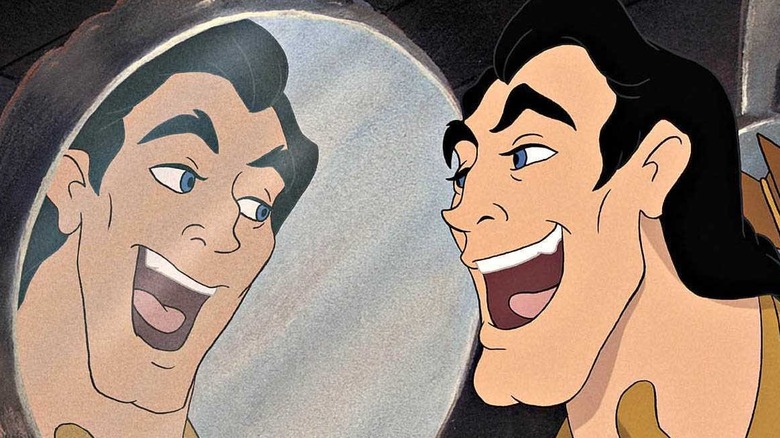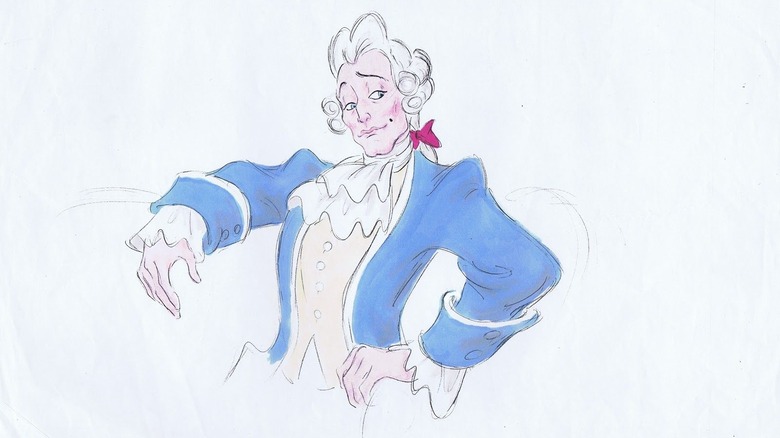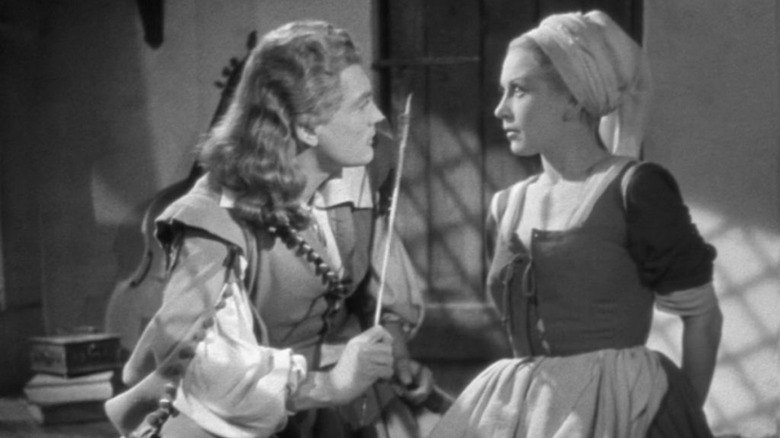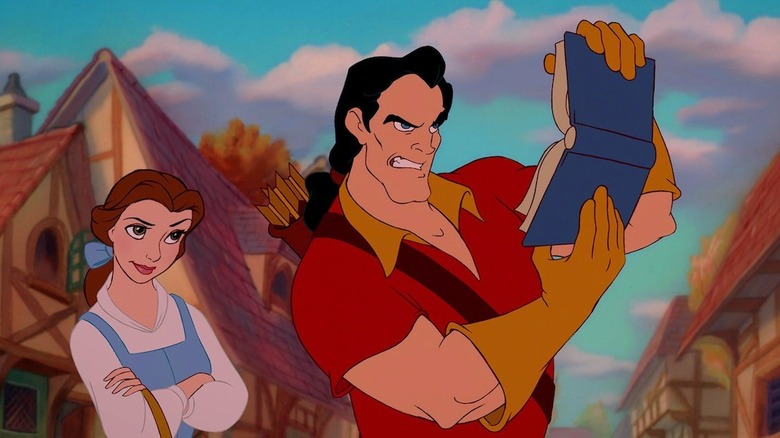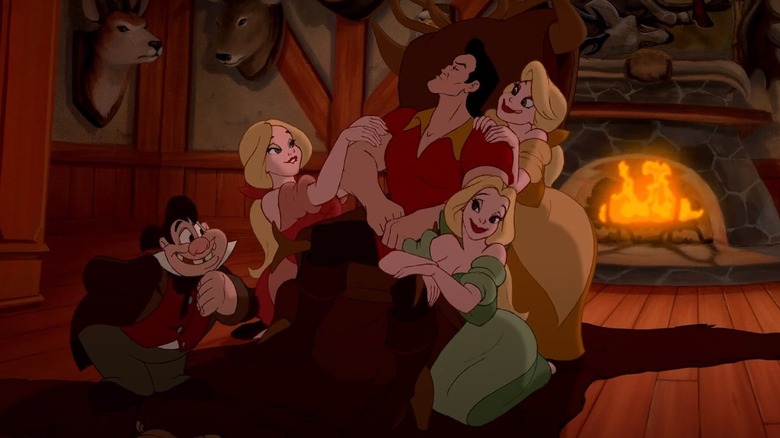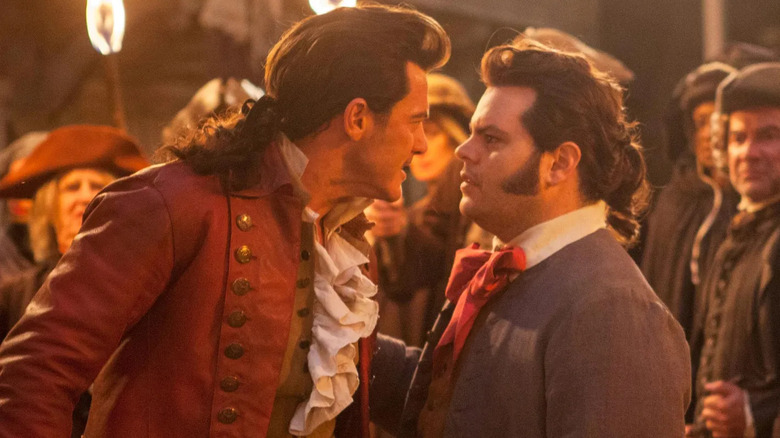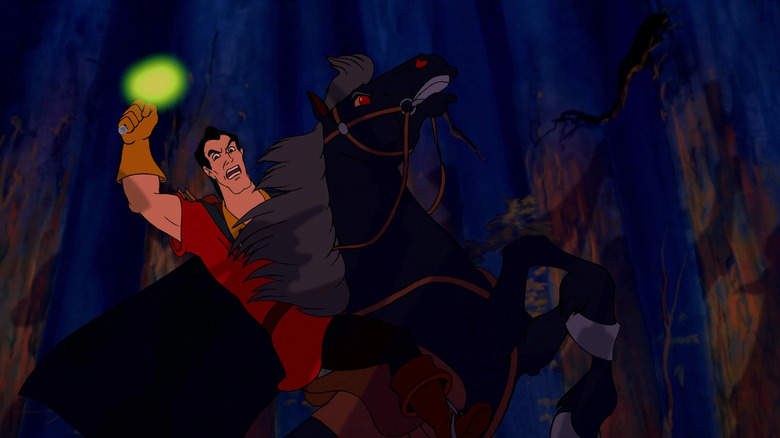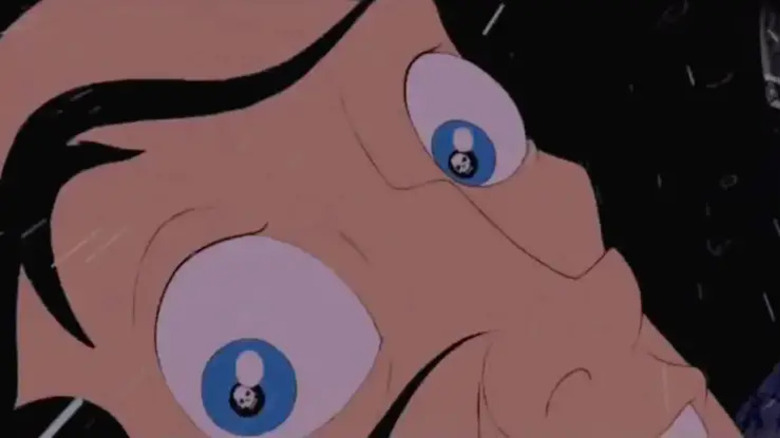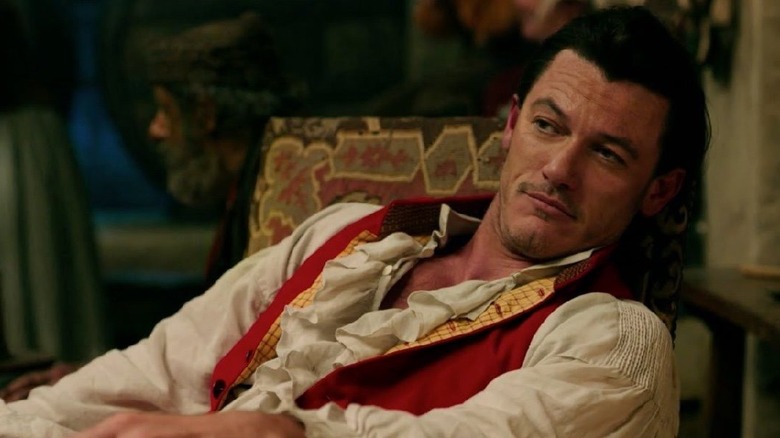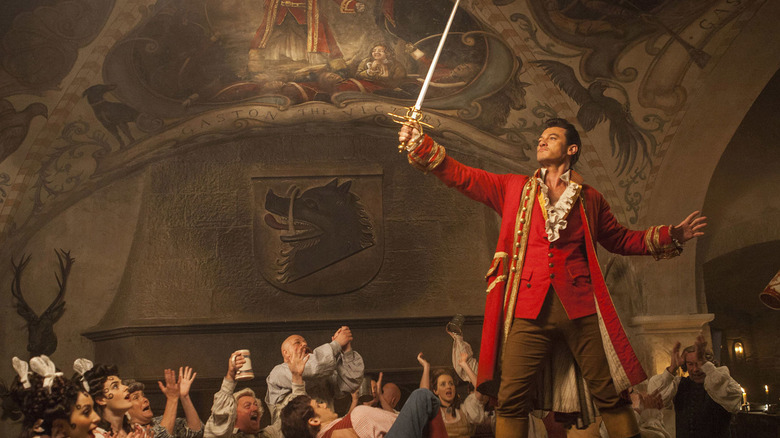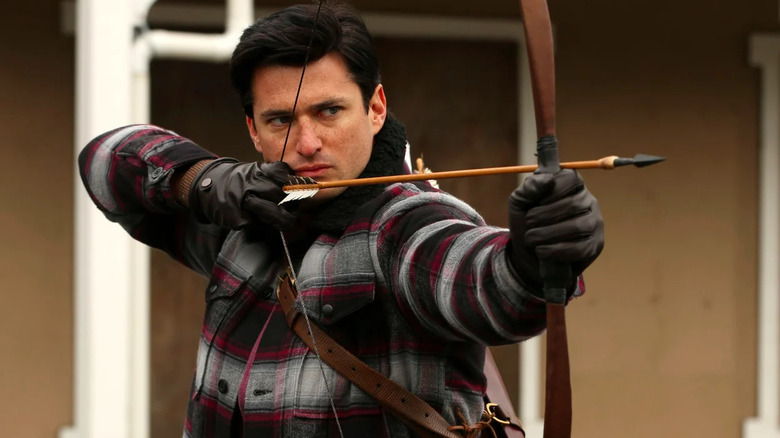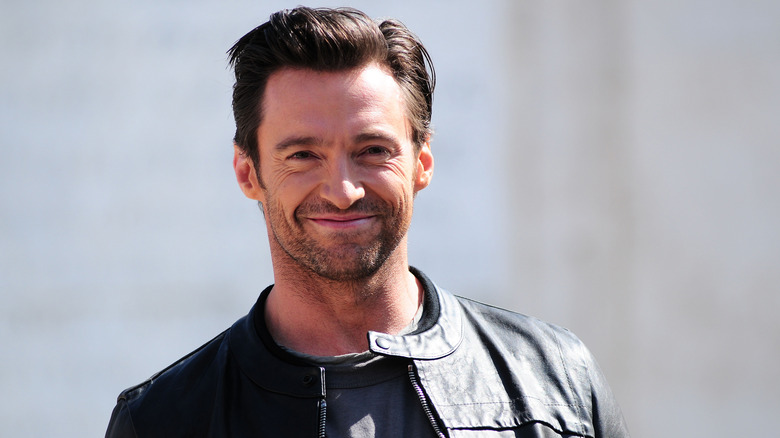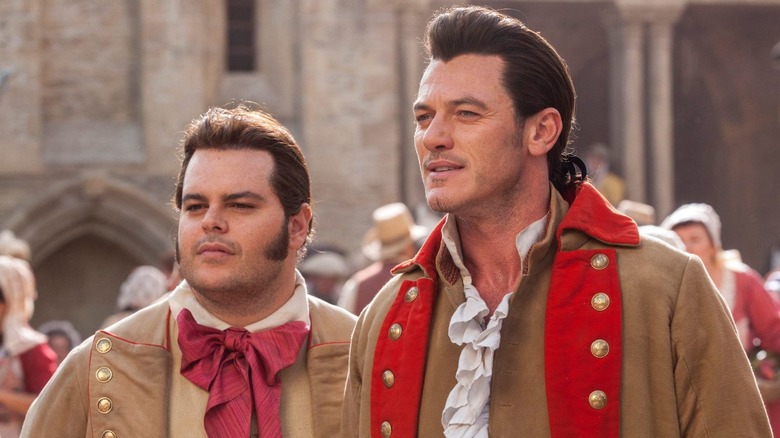The Dark History Of Beauty And The Beast's Gaston
Many Disney movie villains are frightening to us as kids because of their supernatural abilities and the ways they can use magical powers to hurt our favorite characters. But as adults, the truly scary villains are the ones that we know we could encounter in real life. Enter Gaston from 1991's "Beauty and the Beast." Chauvinistic, violent, selfish, self-centered, and egotistical, Gaston is scary simply because all of his qualities are so human. He doesn't have magical powers, he's just a total jerk with a lot of influence, and that's scary for a wide variety of reasons.
"Beauty and the Beast," if you recall, begins in 18th Century France, when an old enchantress visits the castle of a spoiled prince, asking for shelter from the cold in exchange for a rose. When he turns her away, she transforms him into a hideous beast. Years later, an intelligent young girl named Belle dreams of adventure beyond her small-town life, and outside of the attention of the pushy Gaston. Belle eventually becomes the Beast's prisoner, but naturally, the Beast opens up to Belle, and the two fall in love, much to the chagrin of the scorned Gaston. The gorgeously animated film also features an ensemble cast of humans turned household objects, emotional musical numbers, and one of the best Disney heroines in Belle.
But "Beauty and the Beast" also has one of Disney's greatest villains in the vile Gaston. Here's the dark history behind Gaston.
He was originally much different
The Gaston of 1991's "Beauty and the Beast" is a big, strong, macho guy, well aware that he has many physical qualities that women find attractive. The ladies of the town fall for him, think he's "cute," and would love to marry him themselves. He's the typical guy's guy, and a woman like Belle is expected to be flattered that he's selected her for his future bride. But Gaston didn't always start out so macho.
In the original 1988 and 1989 screenplays and storyboards, Gaston was more of an 18th Century French fop. He was originally designed to be tall and thin, with a powdered wig typical of French noblemen at the time. He had a mole on his face and a large, crooked nose. He wore a baby blue jacket and ruffled ascot, instead of the bold red hunting wear.
When eventual final screenwriter Linda Woolverton came on the scene, she changed Gaston entirely, basing his demeanor and attitude on ex-boyfriends. "There's tinges of guys I used to date," Woolverton told the Los Angeles Times. "Gaston was arrogant enough to plan a wedding without asking Belle first, presumptuous enough — when he stopped looking at himself in the mirror — to inform her it was her lucky day when he proposed. It was a lark writing that character . . . I was trying to poke a little fun."
There is no Gaston in the original story
Despite Gaston being the main villain and (getting one of the best songs) in "Beauty and the Beast," the character doesn't actually exist in the original story. Written by French novelist Gabrielle-Suzanne Barbot de Villeneuve and published in 1740, the original tale has no villain. In "La Belle et la Bête," Belle has a gaggle of older sisters who are cruel, selfish, and jealous of Belle's beauty. She also has older brothers who wish to fight and kill the beast for sport.
Much of 1991's "Beauty and the Beast" appears inspired by Jean Cocteau's 1946 film adaptation of the story, including plot points and character traits. In that French classic, there is a character named Avenant, a friend of Belle's brother Ludovic, who proposes to her and whom she rejects. It's from this adaptation that the 1991 film draws much of its inspiration, and the formation of Gaston seems to be a combination of Ludovic's arrogance and stupidity with Avenant's look and obsession with Belle. Avenant attempts to kill the Beast, just like in the animated film, but his fate is a bit different than death: He stumbles into a garden where the Beast lay dying after the fight with Belle at his side. A statue of the Goddess Diana fires an arrow into Avenant's chest, turning him into a beast himself and transforming the beast back into a prince. The funny part here is that both the prince and Avenant were played by the same actor: Jean Marais.
His name offers some insight into his psyche
In "Beauty and the Beast," everyone pretty much only has one name. There aren't a lot of last names in these animated Disney classics to begin with. But it's also implied that "Gaston" is Gaston's last name. There are the three bimbettes who call him Monsieur Gaston in the song "Belle." And then in "Belle (Reprise)" Bell refers to herself as "Madame Gaston, can't you just see it?" This would suggest that Gaston is a surname, but that appears to not actually be the case.
According to Buzzfeed, Gaston's last name in the original script was actually LeGume. The name was dropped, along with a number of other characters, after Woolverton reworked the script. This seems to be confirmed by the fact that in the ABC series "Once Upon a Time," which tells an ensemble tale of various Disney heroes and villains, Gaston's father is named Lord LeGume. On the show, Lord LeGume tries to marry Gaston off to Belle — but we'll get more into that version of Gaston later.
In any case, why is his last name significant? If you know any French, you know that a legume translates to vegetable. But in the English-speaking culinary world, a legume refers to pod-bearing plants, such as beans or peas. So Gaston's last name could be describing him in a couple of ways. Either he's a dull vegetable, or, as the original script perhaps implies, he's small-minded and "pea-brained."
He's a total misogynist
Arguing against Gaston being a misogynist is a futile cause. Not only does he not respect Belle, her choices, or her identity, but he's also cruel to her. He mocks the idea of women reading, and he'd rather have a little wife to keep his house and pop out a ton of kids than do anything that interests her. In fact, he has an outburst when he's told no, probably for the first time in his life. "This is a man who, for the first time in his life, hasn't got what he wanted," actor Luke Evans, who plays Gaston in the 2017 live-action remake, told Empire Magazine.
Indeed, screenwriter Linda Woolverton shaped him that way intentionally. Gaston's disrespect for women is part of his design. "To Gaston, Belle wasn't a person; she was a possession," Woolverton told Cartoon Research. "I think it's great for little boys to see that Beauty doesn't choose him. Not only can they look at Gaston as an example of how not to treat women, but they can hopefully be taught by the Beast, a macho guy who is comfortable with his feelings and gentleness. He could teach a lot of men, in fact, about sensitivity."
He was potentially trapped in the closet
There's no denying that Gaston is a rather macho kind of guy, and his obvious misogyny we tackled already. But was Gaston actually gay? His original design was rather foppish and femininized, but that was far from unusual. In the 18th Century, French noblemen wore high heels, powdered their hair, and covered their faces in makeup. The Gaston of the animated "Beauty and the Beast," by contrast, is much more stereotypically manly. But is his caricature of masculinity merely a front to protect himself?
According to The Guardian, composer Alan Menkin suggests that his songwriting partner, Howard Ashman, wanted to imply that Gaston was gay all along. "Howard referred to Gaston as 'rough trade,'" Menkin tells The Guardian, which is a euphemism for working, lower-class men sought, and often paid for, as sex partners by more privileged or affluent men.
Menkin goes on to add that Ashman put in "winks to that sexuality throughout: 'I'll tell you whose team he prefers to be on,' 'I use antlers in all my decorating'..." Suddenly, LeFou being gay in the 2017 live-action adaptation isn't that far-fetched, and his affections may stem from the idea that Gaston hasn't embraced his true sexuality yet.
He uses fear to incite violence
Because Gaston can't get what he wants, which is basically to marry Belle only because she's pretty, he instead chooses the path of violence. But what's significant is that Gaston preys on the fears of the simple country townsfolk in order to do his bidding. Not only does he take it upon himself to lead a riot, but he also uses their fear of the unknown to lie about the Beast and turn the town into a mob.
This might have just been a story about a bunch of angry townsfolk turning on an unknown threat, but there are darker, real-world implications to his actions. As Teen Vogue writes, Gaston "capitalizes on fear-mongering and propaganda to turn the villagers first against Maurice by calling him crazy, and then against Belle and the Beast with a few choice lies. 'He'll eat your children!' he warns about the creature he's never met, and the townspeople reply in a way that feels very 2017: 'We don't like what we don't understand; in fact, it scares us,' they sing. It's not likely that the writers of the original animated film could predict the current political climate...but the allegory is almost too on-the-nose to ignore....we've seen his witch hunt against the Beast play out in headlines time and time again."
He might not be dead
If you've seen "Beauty and the Beast," you know that Gaston dies in the end, losing his footing after stabbing the Beast while out on the parapets of the castle. He tumbles into the darkness and is presumed dead, but it's left a little ambiguous. In fact, it's so ambiguous that the actor who voiced Gaston in the movie, Richard White, doesn't think Gaston died at all. Despite watching Gaston plummet from a great height into the mist, White, in a co-interview with Belle's voice actor Paige O'Hara for Insider, doesn't buy Gaston's death. "He's convinced that Gaston just had a bad fall," O'Hara says, with White confirming, "He probably got a nasty bump, may have forgotten himself for awhile, and is not quite sure who he is," White said. "We will see him again."
Even though White isn't sure, it's pretty clear that Gaston is dead. The animators didn't add skulls to Gaston's eyes as he fell to his death for no reason. A pretty sure sign that the character is gone, if you ask us!
Luke Evans leaned into the evil
As the actor who played Gaston in the 2017 live-action remake of "Beauty and the Beast," Luke Evans knew exactly which elements of Gaston to embrace, and it wasn't his good qualities. As Evans told Harper's Bazaar, "There's a personality there which sort of is the epitome of a self-absorbed, narcissistic, chauvinistic pig of a man." And yet, Gaston's popularity in the town is evident. "He is nobody, really. He's just a big fish in a little pond who will never leave that little place because he's surrounded by people who put him on a pedestal and make him feel great," he continues.
Even so, Evans fleshed out the character, leaning into Gaston's chauvinism and evil tendencies, while also learning to embrace Gaston's stupidity. "If you're going to play an absolute idiot like him, then do it well. People really get to see a real version of what that is. People like him exist. He is who he is, and sadly, there are people out there that don't take no for an answer. The world revolves around them. He deserves everything he gets [in the end]."
Gaston probably has PTSD
In addition to embracing the character traits that were evident in the original 1991 film, Evans also created more of a backstory for Gaston that provided even further insight into his monstrous nature. Evans speculated that Gaston is probably suffering from some kind of PTSD. As he tells Entertainment Weekly, "I saw massive potential to create backstory and layer him up with intention and objectives. The fact of the story is that Gaston is a war hero and an army captain, and the only reason he's got this celebrity status in Villeneuve is because when he was about 16, he protected the town from a pack of Portuguese marauders in 1740."
Apparently, that sort of thing went on a lot in 18th century France, and would undoubtedly have an impact on a character's mental state. Evans went on to elaborate, saying, "When I first met [director Bill Condon] he asked me to play him darker. There was a lot of anguish inside him, bubbling away. And he wasn't happy that Belle had rejected him. Instead of being this petulant pouting child needing to be fluffed up by his fans in the tavern, there was a much darker side to him." Evans explains that the Gaston he created was a "broken man" with a "military creature" inside of him that emerges when he doesn't get what he wants. Yikes.
The Gaston of Once Upon a Time is no different
The ABC series "Once Upon a Time" turned hundreds of classic and modern Disney characters into live-action people whose experiences were intertwined and affected one another in the greater Disneyverse. The show liked to mix things up a bit. For example, the Beast in "Once Upon a Time" isn't really the Beast we know and love from "Beauty and the Beast," but rather the trickster Rumpelstiltskin (Robert Carlyle), whose evil deeds and magic are transformed by loving Belle (Emilie de Ravin). So since "Once Upon a Time" pulled a switcheroo every now and again, viewers initially thought that Gaston might turn out to be a good guy, especially since Rumple found it so hard to be good.
On the show, Gaston's father Lord LeGume is the one who approaches Belle's father, Maurice, to arrange their marriage, so it isn't Gaston who assumes Belle would fall in love with him just because the whole town does. It's kind of implied at first that Gaston isn't what he seems, or what we think we know of the character. But the Gaston of "Once Upon A Time" soon proves just as evil. When he and Belle encounter a child ogre, Gaston tortures the creature until Belle flees. Gaston also incites the ogres to war, and once he's dead, he forms a pact with Hades in the underworld in order to return and exact his revenge. So yeah, he stayed pretty evil.
A musical comic relief
Gaston may have gone darker for the 2017 live-action version, but back in 1994, his persona took a broader, more comedic look. How could Gaston possible get any broader, you might ask? By hitting the Broadway stage. When "Beauty and the Beast" was transformed into a stage musical, Gaston was given more to do. He got his own solo number, the self-centered proposal number called "Me," and he was given another song with LeFou and Monsieur D'Arque called "Maison des Lunes."
But the big difference in the Gaston of the musical version is how much more comic relief the character is. Sure, he's an evil chauvinist, and the darkness within him is definitely evident by the end. But Gaston's buffoonery is really amped up for the stage show, allowing for big laughs. The role was originated by Burke Moses on Broadway, with Donny Osmond playing the part for a time as well, while down under in Melbourne, Australia, none other than Hugh Jackman originated the role.
He might be coming back...
After the success of 2017's live-action "Beauty and the Beast," rumors began to fly about a potential Gaston movie. It didn't end up taking shape, but in June 2021, Disney announced a prequel series for Gaston and LeFou. According to Deadline, the series was set "years before the Beast and Belle's epic romance," and would "follow Gaston (Evans) and LeFou (Josh Gad) as they set off with LeFou's step-sister, Tilly ([Briana] Middleton), after a surprising revelation from her past comes to light, sending the unlikely trio off on an unexpected journey filled with romance, comedy, and adventure."
But then in February 2022, it looked like the show was put on hold. Both Evans and Gad tweeted that the series had officially been scrapped. Until very recently, that is. Just this past September, Evans gave fans some hope, explaining it was still a go. "It's been put on hold. We just wanna make sure that it is absolutely the best it can be, and if that means we just have to wait a little longer to finesse certain pieces of it, then that's what we're going to do because this is a very important legacy," he said. "We're very excited about it. At some point in the near future, it will happen."
